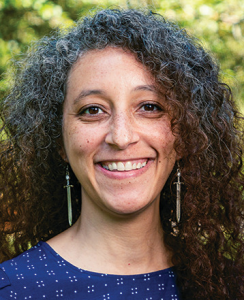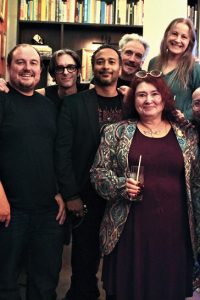The Year in Review 2023 by Alex Brown
In an unintentional yet perfect synchronicity of events, I’m writing this 2023 speculative fiction wrap-up on the last day of the year with a glass of Martinelli’s while waiting for the ball to drop. It was a strange, contradictory year, one with several professional wins and several more personal hardships. Going through my reading log, I got through more books this year than I thought I would (152) but fewer speculative than I intended (a majority was romance and mystery/thrillers), given all the chaos, and I can’t think of a single one I hated or did not finish. Pretty good, if you ask me. So, out of all those, here are some of my favorite reads of the year in adult, young adult, and short fiction, plus a little bonus at the end.
Let’s kick things off with Moniquill Blackgoose’s debut novel, To Shape a Dragon’s Breath. With its extensive worldbuilding, compelling characters, and thrilling premise, there’s a lot to love here. Chuck Wendig is one of my auto-buy authors, and Black River Orchard did not disappoint. I love all his books, but this demon-apple horror novel is my second favorite thus far (nothing will bump the first Miriam Black novel, Blackbirds, off the top). Some Desperate Glory by Emily Tesh snuck up on me. I had no idea what to expect and was blown away by Kyr’s debrainwashing journey. On the other hand, I knew exactly what to expect with Shelley Parker-Chan’s He Who Drowned the World and got even more than I anticipated. The duology, and especially the concluding novel, is clever, ferocious, and emotionally devastating. This was also a fantastic year for small presses, with Leigh Harlen’s A Feast for Flies as one of the best. Set on a space station with a disabled protagonist, the story is short but packed with action, mystery, and romance.
As soon as I read The Siren, the Song, and the Spy by Maggie Tokuda-Hall, A Song of Salvation by Alechia Dow, and The Wicked Bargain by Gabe Cole Novoa I knew I was going to spend the rest of the year being utterly insufferable about them. Tokuda-Hall’s tells of a group of teens – two mermaids, a warrior, a pacifist, a spy, and an assassin – who work together to tear down a brutal empire. Dow’s is a riotous space opera with a trio of ace-spec aliens, one of whom is a reincarnated god, trying to stop a colonizing empire. Novoa’s is set in the early 19th century Caribbean and features queer pirates, you guessed it, taking on a powerful empire. I started and ended my year with a pair of YA novels I absolutely adored. H.S. Valley’s Tim Te Maro and the Subterranean Heartsick Blues is a gorgeous cozy romance about a Māori teen unwittingly falling for his so-called nemesis while also learning howto process his anxieties. Sarah Hollowell’s What Stalks Among Us is a strange book about a pair of teens who wander into a corn maze; as they try to escape, they keep encountering their own corpses.
 I read so much short speculative fiction that narrowing down to five is a herculean task, but here’s what I got. These are some stories that I cannot stop thinking about even months after reading. Oluwatomiwa Ajeigbe’s eerie Lightspeed story “The House of Linear Change” is about a shifting house and a narrator who longs to break free of their imprisonment. “We, the Ones Who Raised Sam Gowers from the Dead”, Cynthia Zhang’s PseudoPod piece, may seem like a simple resurrection plot on the surface but is really a rallying cry for upending oppressive systems.
I read so much short speculative fiction that narrowing down to five is a herculean task, but here’s what I got. These are some stories that I cannot stop thinking about even months after reading. Oluwatomiwa Ajeigbe’s eerie Lightspeed story “The House of Linear Change” is about a shifting house and a narrator who longs to break free of their imprisonment. “We, the Ones Who Raised Sam Gowers from the Dead”, Cynthia Zhang’s PseudoPod piece, may seem like a simple resurrection plot on the surface but is really a rallying cry for upending oppressive systems.
In Translunar Travelers Lounge, Sherry Yuan tells a charming story about a Chinese Canadian werewolf trying to make a good first impression on her boyfriend’s family with “Mooncakes”.
Sunday Morning Transport shared A.R. Capetta’s “Resurrection Highway”, a wild ride of machine magic set in a postapocalyptic United States. “Forte/Foible or At the Center of Percussion” in Baffling defies description, so just go read it and relish Ash Howell’s gorgeous, chilling words.
I also read a few books that came out in previous years. Rachel Hartman’s Seraphina, her first novel and the story that launched two duologies, is one that is going to haunt me in the best possible way for a very long time. Hartman has a way with words that make you feel like you’re sinking into a fairy tale, one of the dark, frightening, old-school ones. In preparation for the television show, I read The Changeling by Victor LaValle. As much as I liked the show, the book was phenomenal. A gut punch and a hug all in one. Shutter by Ramona Emerson, The Story of the Hundred Promises by Neil Cochrane, and Babel: An Arcane History by R.F. Kuang all came out in 2022 but are very different. Shutter is a good old-fashioned crime novel made new with a Diné protagonist who is tormented by ghosts, one in particular who forces Rita to expose her killer at all costs. The Story of the Hundred Promises is a soft, quiet fantasy about a trans sailor and a nonbinary enchanter and the delicate love that blooms in their traumatized hearts. Most of you probably already know about Babel, so let me just say it was as stunning, vivid, and pull-no-punches as everyone said.
Alex Brown is a librarian, author, historian, and Hugo-nominated and Ignyte award-winning critic who writes about speculative fiction, young adult fiction, librarianship, and Black history.
This review and more like it in the February 2024 issue of Locus.
 While you are here, please take a moment to support Locus with a one-time or recurring donation. We rely on reader donations to keep the magazine and site going, and would like to keep the site paywall free, but WE NEED YOUR FINANCIAL SUPPORT to continue quality coverage of the science fiction and fantasy field.
While you are here, please take a moment to support Locus with a one-time or recurring donation. We rely on reader donations to keep the magazine and site going, and would like to keep the site paywall free, but WE NEED YOUR FINANCIAL SUPPORT to continue quality coverage of the science fiction and fantasy field.
©Locus Magazine. Copyrighted material may not be republished without permission of LSFF.







